Home Tags Posts tagged with "euro 2012"
euro 2012
Italian striker Mario Balotelli was sporting three tramlines of blue sticky tape on his back in the Euro 2012 Championship.
And at Wimbledon, Serbian tennis player Novak Djokovic has had his elbow patched up with the same stuff.
So what’s behind this latest sporting fad?
The Japanese makers of Kinesio tape say it gives players an edge by mending injuries.
Although it might seem like a new idea, the tape has been around since the 1970s.
The brainchild behind the tape, Dr. Kenzo Kase, says he came up with the design because he found standard taping techniques, like conventional strapping, too restrictive for his patients.
Although standard strapping provides muscle and joint support, it limits movement and, according to Dr. Kenzo Kase, gets in the way of the healing process by restricting the flow of inflammatory fluids below the skin.
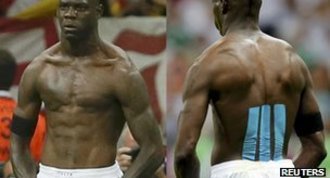
The Japanese makers of Kinesio tape say it gives players an edge by mending injuries
Kinesio tape is different, he says, because it lifts the skin to assist this lymphatic flow, which, in turn, reduces pain and swelling.
However, Dr. Kenzo Kase admits there have been too few studies to prove these scientific claims.
Dr. Kenzo Kase says people have been using his tape with success for more than 30 years. But he recognizes that only solid scientific evidence can silence critics.
“We have many people researching but the society of Kinesio taping therapy itself – the International Kinesio Taping Association – is only five years old. We need more evidence. We do not have research reports. Part of the reason people are using Kinesio tape is to find the science.”
Another element to consider is the power of persuasion or “placebo effect” – if you believe something will work then you will see results.
John Brewer, a sports professor at the University of Bedfordshire, said: “Personally, I think it is more of a placebo effect. There is no firm scientific data to show that it has an impact on performance or prevents injuries.
“My concern is that there is little that you can put on the skin that will have a real benefit for the muscles that lie deep beneath.
“The power and stress going through the joints is immense.
“But, saying that, I can’t see it would cause any real problem, other than making you lose a few hairs.”
In theory, anything that can lessen the oscillations or vibrations that go through the muscle when you are doing intense sport will be beneficial, he said.
Phil Newton, a physiotherapist at Lilleshall, one of the UK’s National Sports Centres, said: “It’s a multimillion-pound business, yet there’s no evidence for it. There’s a whole host of companies making this tape now.
“A lot of medical practitioners do use it.
“It is different to the various types of tape that physios have been using for donkey’s years to strap sprained ankles and so on.
“This is a relatively new type of tape that is thin and light weight. The idea behind it is fascial unloading – reducing pressure in the tissue below the skin.”
Dr. Phil Newton remains dubious. “Looking at the tensile strength of the tape I don’t see how it could do it unless it is down to stimulating the senses. The power of placebo is very strong and shouldn’t be underestimated.”
He predicts the Olympics will be awash with the stuff. “It’ll be a show of multicoloured tape.”
“We’ll probably see athletes in the Olympics sporting a few union jacks made out of it,” he said.
Dr. Kenzo Kase certainly hopes so.
He said: “Olympians are very top athletes. Top athletes are very different from regular athletes. They are hypersensitive and they worry. My tape will give lots of comfort to them. This is not drugs.”
Spain wins Euro 2012 final after beating Italy with 4-0 and claiming a successive European crown to add to their 2010 World Cup triumph.
Vicente del Bosque’s side staged a compelling claim to be the greatest international side of all time as the Euro 2012 final was transformed into an exhibition with Italy – who performed creditably for long periods – passed brutally into submission.
David Silva’s header was reward for Spain’s early supremacy and new Barcelona recruit Jordi Alba doubled the lead just before half-time with a blistering run and finish.
The scoreline was emphatic at the conclusion but Italy performed with great resolve. Once they were reduced to 10 men after losing third substitute Thiago Motta to injury, however, they were ruthlessly exposed by masters of the passing art.
Fernando Torres emerged as a late substitute to make a powerful impact; steering home Spain’s third then setting up Chelsea team-mate Juan Mata to inflict the final wound on a bedraggled Italy.
Spain’s virtuoso performance was a decisive answer to a growing band of critics who had forced coach Vicente Del Bosque and his players to defend themselves against allegations that they had been “boring” throughout Euro 2012 at the pre-match media conference.
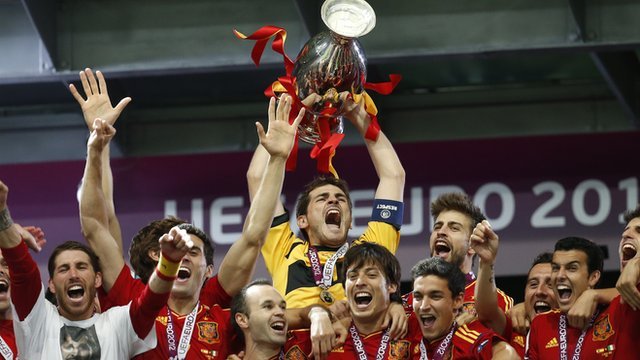
Spain wins Euro 2012 final after beating Italy with 4-0 and claiming a successive European crown to add to their 2010 World Cup triumph
And even Arsenal manager Arsene Wenger, in a spectacularly ill-timed contribution, wrote that Spain “have betrayed their philosophy and turned it into something more negative”.
Every quality that has led to them dominating world football since they won Euro 2008 and the World Cup in South Africa two years later was brought to bear.
It was a heartbreaking night for Italy and coach Cesare Prandelli but there was no shame in being beaten by a team of such quality. They can reflect with satisfaction on their work before this chastening evening.
Spain, perhaps stung by the words of criticism aimed in their direction, started with a pace and tempo of passing that the Italians found impossible to live with.
The warning signs were posted for Italy when a long spell of possession ended with Xavi shooting just over – but it was not long before they were ahead.
Cesc Fabregas was employed in the so-called “False Nine” role as Del Bosque played without a conventional striker. The former Arsenal star proved the tactic is a positive force rather than a negative one.
He collected the masterly Andres Iniesta’s pass and outflanked Italy defender Giorgio Chiellini before delivering perfectly for Silva to head beyond keeper Gianluigi Buffon.
It was Chiellini’s final contribution as he swiftly succumbed to the thigh injury that has been troubling him in the later stages of the tournament and was replaced by Federico Balzaretti.
Italy’s response to Silva’s goal and the early Spanish onslaught was commendable as Antonio Cassano twice had shots saved by keeper Iker Casillas but a goal of brilliance in creation and execution made their task mountainous.
Alba demonstrated exactly why Barcelona were so keen to bring the graduate of their famous La Masia youth academy back to the Nou Camp from Valencia when he finished a blurring run on to Xavi’s perfect pass with a composed finish past Buffon.
Prandelli acted during the interval, sending on Antonio Di Natale for Cassano. Twice he almost got the goal that could have halted Spain, heading just over before bringing a fine save out of Casillas.
Italy’s third and final change came when Motta replaced Riccardo Montolivo but Italy’s luck was summed up when he suffered a hamstring injury within minutes and the Azzurri were reduced to 10 men.
Spain were now winning with something to spare and Del Bosque took the opportunity to remove the outstanding Fabregas and introduce Chelsea striker Torres for the closing stages.
It was an opportunity he took, adding the final flourishes by steering home Spain’s third and unselfishly setting up Mata’s finish to round off a spectacular performance.
Dutch coach Bert van Marwijk has resigned following his side’s disastrous Euro 2012 campaign.
Dutch team was beaten in all three of their matches in the tournament and finished bottom of Group B.
Bert van Marwijk, 60, refused to answer questions about his future last week but his departure has now been confirmed by the Dutch FA.
Bert van Marwijk led the Netherlands to the 2010 World Cup final in which they were beaten by Spain in extra time.
“I have severe doubts, but have decided to take this step anyway,” Bert van Marwijk said in a statement.

Dutch coach Bert van Marwijk has resigned following his side's disastrous Euro 2012 campaign
The head of the KNVB (the Dutch FA), Bert van Oostveen said: “The KNVB are grateful to Van Marwijk. I personally had a very good feeling about our co-operation.
“Of course it is sad to part early, but we must be realistic.”
The Netherlands won nine of their 10 qualifying matches for Euro 2012, rising to the top of the FIFA world rankings in August 2011.
But drawn in the “Group of Death” with Denmark and eventual semi-finalists Germany and Portugal, they lost three consecutive competitive games for the first time in their history.
A 1-0 opening defeat by Denmark was followed by 2-1 defeats against Germany and Portugal.
The performances were in stark contrast to their displays at the 2010 World Cup, in which the Dutch took maximum points in Bert van Marwijk’s first tournament as coach.
The Dutch went on to reach the final, but Bert van Marwijk’s negative tactics in a bad-tempered game against Spain led to criticism from the media and Dutch legend Johann Cruyff.
Bert van Marwijk, who has previously coached Feyenoord and Borussia Dortmund, had taken over from Marco van Basten in 2008 and had a contract that ran until 2016.
The Netherlands have a friendly against Belgium on 15 August before starting their 2014 World Cup qualifying campaign against Turkey in September.
In recent years, all other major football nations have been playing catch up as they attempt to find a way of coping with the brilliance of the Spanish team. The combination of brilliant technique, fast pass-and-move football, and robust physical presence on the ball has made the Spanish team appear almost unstoppable over the last half decade. Having first captured the European Championships in 2008, to overcome the psychological nightmare of decades of underachievement, they went on to clinch the World Cup two years later and cement their status as the dominant force in international football. So with another major tournament in full swing, the question those watching the games and/or those involved with Euro 2012 Football Betting on sites like Bwin are asking is: will this domination continue?
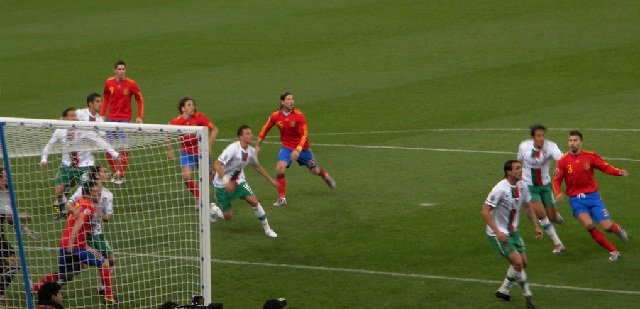
When looking at the all-conquering achievements of the Spanish national team over the last half decade, it should be noted that this has been paralleled by a similar dominance in club football of the Spanish side Barcelona. Perhaps the apex of this was the final of the Champions League in 2011, when Barcelona took on the best team in England – Manchester United – and made them look second rate. However this season has seen frailties begin to appear in Barcelona’s armory, as they failed to win their domestic league and were knocked out of the Champions League in the semi-finals. When you consider that Spain’s other major team – Real Madrid – also fell at the same stage, this may offer some hope to the other teams.
Throw in the continued problems being experienced by Fernando Torres, and this is further grounds to think that Spain may not have things all their own way. However, we must keep things in perspective: Torres was struggling in 2010 and Spain still won the World Cup, while Champions League semi-final appearances by both Barcelona and Real Madrid hardly constitute a collapse in Spanish domestic football. The biggest encouragement for those hoping for a genuine challenger to Spain comes in the form of the strength of other sides – most notably Germany and the Netherlands – rather than the weakness of Spain.
UEFA gives a suspended six-point deduction to Russia because of the behaviour of their fans during their 4-1 win against Czech Republic at Euro 2012.
Action was taken due to the use of fireworks and far-right banners.
The incident, in which Russian fans attacked stewards, leaving four needing hospital treatment, is being investigated by UEFA and police.
The penalty will apply to the Euro 2016 qualifying campaign, and also includes a fine of 120,000 Euros ($147,000).
Russia, who will host the 2018 World Cup, could face further sanctions after their supporters were involved in violence before their game against Poland, which was drawn 1-1, on Tuesday.

UEFA gives a suspended six-point deduction to Russia because of the behaviour of their fans during their 4-1 win against Czech Republic at Euro 2012
A march by thousands of Russian fans to mark their national day had to be halted and some missiles were thrown as supporters clashed with their Polish rivals.
Police say they arrested at least 120 people and that 10 people were injured.
Inside the ground, Russian fans also displayed a provocative banner.
New clashes have broken out in Polish capital Warsaw between rival Russian and Polish football fans ahead of a Euro 2012 tie between the two teams.
A march by thousands of Russian fans to mark their national day had to be halted and some missiles were thrown.
Police say 56 arrests were made and that seven people were injured in the violence.
Tensions are running high, given the centuries of rivalry between the two countries.
About 6,000 police were on duty to keep the rival fans apart.
The match began at 20:45 local time.
Beforehand, some Polish fans on a bridge on the march route had tried to attack the Russian fans and had been involved in scuffles.

New clashes have broken out in Polish capital Warsaw between rival Russian and Polish football fans ahead of a Euro 2012 tie between the two teams
It was relatively easy for police to contain clashes while the Russians fans were heading down a planned route, but it may more difficult when they spread across town later.
Tear gas, rubber bullets and water cannon were used to disperse fans at the end of the march, according to Poland’s state news agency.
In a separate incident, 50 Polish fans in masks attacked Russian fans in a Warsaw cafe, the Russian news agency Interfax reported.
Russia occupied Poland for more than a century and dominated it during the Cold War, after World War II.
The conservative Polish opposition condemned the march as a provocation, but it was approved by the authorities.
The Russian national holiday marks Russia’s declaration of sovereignty in 1990 – a key episode in the demise of the Soviet Union.
Polish media highlighted fears that some Russian fans may sport Soviet flags and symbols – a highly sensitive issue for the many Poles who deplored communist rule.
“March or street war?” said a headline in the conservative Polish daily Rzeczpospolita. It quoted Wojciech Wisniewski, a member of the Polish Union of Football Fans, as saying “somebody really wants to make Polish football fans attack the Russians”.
European football’s governing body UEFA has opened disciplinary proceedings against Russia after a series of incidents involving the country’s fans at Euro 2012.
Russian fans were caught on camera kicking and punching stewards inside the stadium at Wroclaw, in western Poland, after their team beat the Czech Republic 4-1 on Friday. Four stewards needed hospital treatment.
Anti-racist monitors at the match said a section of the crowd racially abused the Czech Republic’s only black player, Theodor Gebre Selassie.
In a statement on Monday, Russian football association said: “We urge all football fans now in Poland to remember that they represent Russia. Please respect yourselves, your country and your team.”
[youtube Uj0MXWVSV4k]
UEFA has initiated disciplinary proceedings against the Football Union of Russia for “improper conduct of supporters” during Friday’s Euro 2012 game against the Czech Republic in Wroclaw.
Four stewards needed hospital treatment after being attacked by fans in the Municipal Stadium in Poland.
And claims of racist abuse directed at Czech defender Theodor Gebre Selassie, who is black, are being investigated.
The Control and Disciplinary Body will review the case on Wednesday, 13 June.
A UEFA statement read: “Having looked at the security reports and available images, UEFA has today announced that disciplinary proceedings have been opened against the Football Union of Russia [RFS] for the improper conduct of its supporters, the setting off and throwing of fireworks, and the display of illicit banners at Friday’s UEFA match.”
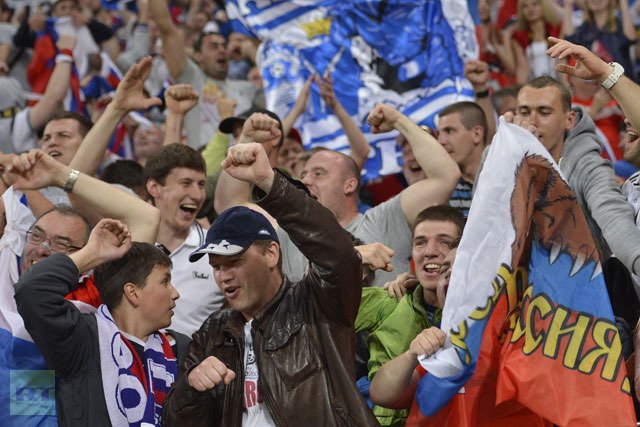
UEFA has initiated disciplinary proceedings against the Football Union of Russia for "improper conduct of supporters" during Friday's Euro 2012 game against the Czech Republic in Wroclaw
Anti-racism campaigners claimed Czech defender Theodor Gebre Selassie was the victim of monkey chants during Russia’s 4-1 victory, while footage seemingly shows Russian supporters attacking stewards in a walkway of the stadium.
The FARE (Football Against Racism in Europe) network confirmed one of their observers at the match heard “fleeting” racist abuse of Gebre Selassie.
Asked if it included monkey chants, FARE chief executive Piara Powar said: “Our observer reported descriptions of that nature.
“It was directed at the Czech Republic’s only black player,” Piara Powar added.
Footage of the incident involving the stewards has emerged online, with UEFA releasing a statement saying they are aware of “a brief and isolated incident involving a small group of around 30 fans who attacked a handful of stewards”.
The statement continued: “The situation was quickly and efficiently brought under control. The local police are aware of the incident and investigating.
“The cause of the incident is not currently known but we are studying the security reports and available images. UEFA remains entirely committed to the safety and security of all fans and spectators at all matches of Euro 2012.”
The tournament has already been beset with problems of racism, with UEFA confirming on Friday there were “isolated incidents of racist chanting” aimed at Netherlands players during an open training session.
[youtube w2NfqPsls2Y]
Irish football fan Oliver Coughlan is the target of a worldwide web hunt after he left his tickets for Ireland’s three Euro 2012 matches in a Champion Sports shop in Dublin Airport.
“The tickets are for Ireland’s games against Croatia, Italy and Spain,” said Paul O’Kane at Dublin Airport.
“I can only think that somewhere in Poland, the poor man is putting his hand in his pocket for his tickets and figuring out that they’re gone.”
The tickets were found in the airport shop at 10:00 BST on Friday.
The authorities think that Oliver Coughlan must have flown out without them.
But thanks to the honesty of staff at Champion Sports and the quick thinking of the airport media department, the hunt for Oliver has taken to Twitter and Facebook. His story has featured on Irish radio and on news websites.
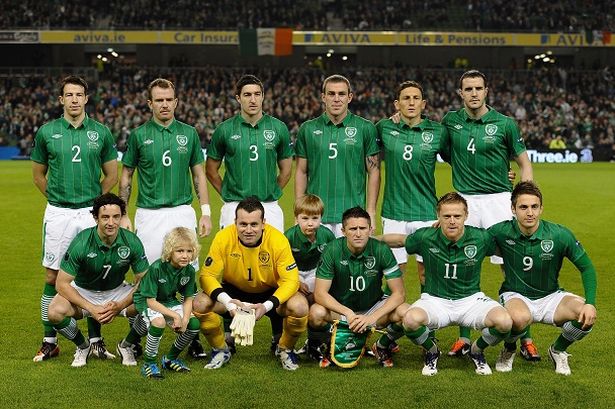
Irish football fan Oliver Coughlan is the target of a worldwide web hunt after he left his tickets for Ireland's three Euro 2012 matches in a Champion Sports shop in Dublin Airport
His story has gone viral.
“We have tweeted and Champion Sports have posted messages on their Facebook,” said Paul O’Kane, director of public affairs at the airport.
“The story has been picked up by RTE and local radio stations.
“I can only think that the first game is on Sunday evening so we have a bit of time to find him. Ten years ago, trying to track him down would have been very difficult. Now, thanks to new media and social networks we have a chance of reuniting him with his tickets before Sunday’s match.”
The airport lines have been buzzing with people wondering about those tickets – some of them have even offered to buy them.
But the airport is keen to do the right thing by Oliver Coughlan – they are trying their best to reunite him with his tickets and have asked the public to help them find him.
UEFA confirms there were “isolated incidents of racist chanting” aimed at Netherlands players during an open training session at Euro 2012.
But the governing body has not revealed whether it is investigating the incident in Krakow, Poland.
Dutch captain Mark van Bommel said monkey chants were directed at players.
“Should such behaviour happen at further training sessions, UEFA would evaluate the operational measures to be taken to protect players,” UEFA said.
“UEFA has now been made aware that there were some isolated incidents of racist chanting that occurred at the open training session of the Dutch team yesterday in Krakow.
“UEFA has a zero tolerance policy when it comes to discriminatory behaviour and has given the power to referees to stop matches in case of any repeated racist behaviour.”

UEFA confirms there were "isolated incidents of racist chanting" aimed at Netherlands players during an open training session at Euro 2012
The Dutch FA said in a statement that it would not be making an official complaint but was “more than willing to answer [the] questions of UEFA in this respect”.
Outlining the incident, the statement added: “As at one moment there was a lot of noise coming from a specific stand, the team decided to train at the other side of the stadium, which was much quieter.
“A few players have heard sounds, which could be described as possible monkey chants. However, the training staff on the pitch were not aware of this.”
While Mark Van Bommel complained specifically of racist abuse, the Dutch FA had earlier said this was mixed with anti-Euro 2012 chanting believed to have been prompted by the fact the city has not been given any matches in the tournament.
When this was put to Mark Van Bommel on Thursday, he said: “Open your ears. If you did hear it and don’t want to hear it, that is even worse.”
The claims emerged on the opening day of the tournament, which is being co-hosted by Poland and Ukraine.
Around 20,000 fans had turned up to watch the training session at the Stadion Miejski on Wednesday.
Journalist Marcel van der Kraan, who writes for Dutch newspaper De Telegraaf, said he heard the racist abuse.
He said: “As the Dutch players did their warm-up, during the first lap of the pitch they could hear monkey noises from one end of the crowd.
“When the players heard this they said they would do another lap and if they heard monkey noises again they would stop.
“The Dutch coach moved all the cones and started training on the pitch as far away from these people as possible. It was considerably more than two or three people.”
The day before the alleged abuse, the Netherlands players had visited Nazi concentration camp Auschwitz, which is nearby.
Mark Van Bommel said: “It is a real disgrace, especially after getting back from Auschwitz, that you are confronted with this.
“We will take it up with UEFA and if it happens at a match we will talk to the referee and ask him to take us off the field.”
Earlier this week, UEFA president Michel Platini said the issue was one for wider society, not simply football. But he added that referees had the power to stop games if there was racist abuse from the stands.
The tournament kicks off at 17:00 BST on Friday with hosts Poland playing Greece in the opening match in Warsaw.
Midfielder Stefano Mauri, the captain of Lazio football team, has been arrested by police investigating claims of match-fixing.
Stefano Mauri, 32, was held along with former Genoa midfielder Omar Milanetto, 36, police said.
Juventus coach Antonio Conte, who just led the club to the Serie A title in his first season in charge, is among those being questioned by police.
Officers also visited Italy’s pre-Euro 2012 training camp to question left-back Domenico Criscito, 25.
Police are searching more than 30 homes, including those of players, trainers and administrators of clubs in Serie A, Serie B and lower divisions.
Five people were also arrested in Hungary on suspicion of being part of an illegal international betting ring.
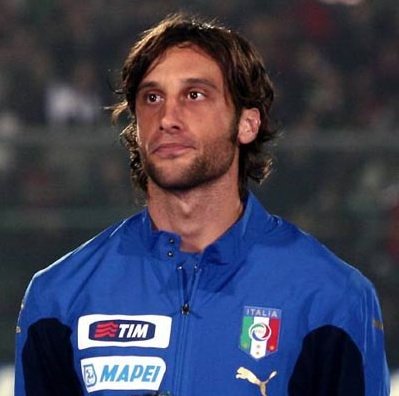
Midfielder Stefano Mauri, the captain of Lazio football team, has been arrested by police investigating claims of match-fixing
Monday’s operation was part of a wider investigation which has already seen a number of arrests of current and former Italian players. In June last year, the Interior Ministry set up a special match-fixing task force in response to a number of high-profile cases.
Former Atalanta captain and Italy midfielder Cristiano Doni was banned for three-and-a-half years in August for his part in the “Calcioscommesse” scandal involving Serie B matches last season. He was also arrested in December 2011 over match-fixing and betting allegations.
Atalanta, promoted from Serie B, were deducted six points in the top flight this season as a result of the scandal.
Former Lazio and Italy striker Giuseppe Signori was banned for five years and 15 other players were banned for between one and five years for their parts.
Stefano Mauri, who joined the Rome club from Udinese in 2006 and has 11 caps for Italy, made 16 league appearances last season as Lazio finished fourth in Serie A.
Omar Milanetto signed for Serie B side Padova last summer after five years at Genoa and made 15 starts last season.
Domenico Criscito, a former Genoa and Juventus defender, is now at Zenit St Petersburg in Russia and has 19 caps for Italy.
Ukraine denounces a threatened EU boycott of next month’s Euro 2012 football championship as “destructive”.
In a statement, Ukraine’s foreign ministry said the move would undermine the image of the tournament and be detrimental to millions of Ukrainians and Poles.
Poland – which is co-hosting Euro 2012 – has also criticized any boycott.
Several European leaders are considering cancelling their trips to Ukraine, in protest over the treatment of jailed former PM Yulia Tymoshenko.
Yulia Tymoshenko, who is on hunger strike, alleges she was beaten by prison guards.
The statement from the Ukrainian foreign ministry said sport events were designed to bring unity, and criticized what it said were attempts to politicize them.
“We view as destructive attempts to politicize sporting events, which since ancient times have played a paramount role in improving understanding and agreement between nations,” the statement said.
“A successful championship will be a victory not for politicians, parties or ideologies, but for all Ukrainians and Poles. Its failure will be a loss for millions,” it said.
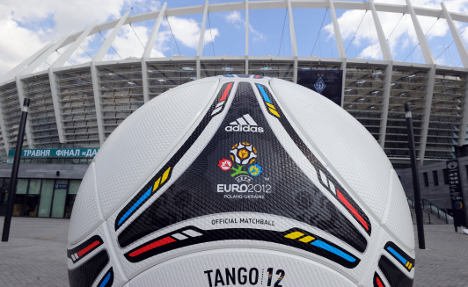
Ukraine denounces a threatened EU boycott of next month's Euro 2012 football championship as "destructive"
Austria has said it will boycott all the matches in Ukraine, while the Netherlands said it will not attend unless Yulia Tymoshenko’s treatment improves.
On Thursday, EU officials said European Commissioner Jose Manuel Barroso would not be attending.
German Chancellor Angela Merkel is also reported to be considering boycotting the event, while the UK says it is undecided on whether to attend.
Meanwhile, five European presidents – from Austria, the Czech Republic, Germany, Italy and Slovenia – have said they will not attend a Ukrainian summit of Central and East European leaders next week in Yalta.
In an attempt to ratchet up the pressure further, Germany earlier said the EU is prepared to delay a trade agreement with Ukraine.
German Foreign Minister Guido Westerwelle said that “with our EU partners we are unanimous that the EU Association Agreement with Ukraine cannot be ratified as long as the rule of law in Ukraine does not develop in the right direction”.
But Ukraine’s deputy prime minister has said Euro 2012 is on track and UEFA – European football’s governing body – had not complained.
“The tournament is ready and on 11 May we will be transferring the control of the four stadia to UEFA.”
Yulia Tymoshenko, a former prime minister, was jailed last year for abuse of office, in a trial condemned by the West as politically motivated.
She is an arch-rival of Ukraine’s President Viktor Yanukovych, who beat her to the presidency in February 2010, avenging his defeat in the 2004 Orange Revolution.
The opening games of the month-long Euro 2012 will be played on 9 June.
UEFA has confirmed that yellow cards rules used by the Champions League will not be changed for at least three years.
Seven players are suspended for the Chelsea vs. Bayern Munich final after six were cautioned in the semi-finals.
The rules are different for Euro 2012 when UEFA will wipe the slate clean for yellow cards after the quarter-finals.
A UEFA spokesman said: “Different rules can apply in different competitions. The rules are a result of careful, democratic procedure.”

UEFA has confirmed that yellow cards rules used by the Champions League will not be changed for at least three years
International players’ union FIFPro had made a plea for the six players who are suspended to be allowed to play, which was rejected.
Chelsea’s captain John Terry will also be suspended after being sent off against Barcelona in the semi-final second leg at the Nou Camp.
Michael van Praag, head of UEFA’s Champions League Rules group, was quoted on FIFPro’s website saying: “We have just had three sessions with representatives of the European Clubs’ Association and others, in which we confirmed the rule for the coming three years.
“We did not receive any request whatsoever concerning the yellow card rule, not even from the representative of Bayern Munich. And so we will be continuing the rule for the next three years.”
Before that announcement, Simon Barker – a spokesman for FIFPro – had said: “Anybody committing a serious offence in the semi-final should be awarded a red card and miss the final, but the offences that result in a yellow card do not justify the serious punishment of missing the match of your life.
“Some people say this will give players the licence to kick all and sundry during the semi-final, but that is utter nonsense.
“Any serious offence will result in a red card and that still means exclusion from the final.”
At Euro 2012, only players sent off in the quarter-final or semi-final will be banned from the final in Kiev.
German media reports that pressure is mounting on the government to boycott Euro 2012 matches in Ukraine this summer because of alleged mistreatment of the jailed former PM and opposition leader Yulia Tymoshenko.
Chancellor Angela Merkel is considering such a boycott, the German news website Der Spiegel reports.
Environment Minister Norbert Roettgen said the government should stay away from Ukraine during the tournament. Ukraine is co-hosting Euro 2012 with Poland.
Yulia Tymoshenko says she is very ill.
She is reported to be on hunger strike and on Friday images appeared showing bruises on her body, which she says prison guards inflicted. She is being held in Kharkiv, eastern Ukraine.
An official in the Ukraine Prosecutor’s Office, Vadim Goran, denied her allegation, saying the bruises came from “pushing against blunt, hard objects, or banging into them” and “in no way resulted from a punch to the stomach as she says”.
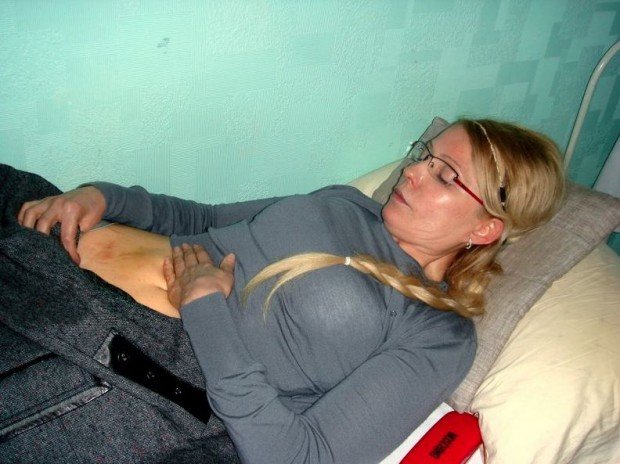
Germany warns to boycott Euro 2012 matches in Ukraine because of alleged mistreatment of the jailed Yulia Tymoshenko
After seeing the photos Sweden’s Foreign Ministry summoned the Ukrainian ambassador and demanded an explanation.
Yulia Tymoshenko, key rival of Ukraine’s President Viktor Yanukovych, is serving a seven-year jail sentence for abuse of office and faces another trial on tax evasion charges.
The new trial has been delayed until late May because she is refusing to attend on health grounds. Yulia Tymoshenko accuses Viktor Yanukovych of exacting political revenge on her.
The authorities have denied her request to be treated abroad. She is said to have been suffering months of back pain and is reported to have been diagnosed with a herniated spinal disc.
Norbert Roettgen, quoted by Germany’s Bild newspaper, said the Ukrainian “dictatorship” must not be allowed to exploit Euro 2012 for its own benefit.
“That’s why I think visits by ministers and prime ministers to Euro 2012 are out of the question in current circumstances,” he said.
The German team will play the Netherlands in Kharkiv on 13 June. The tournament runs from 8 June to 1 July.
Germany’s Social Democrat opposition leader Sigmar Gabriel also called for a boycott.
On Thursday, Germany’s President Joachim Gauck called off his visit to a summit in the Ukrainian resort of Yalta next month. Czech President Vaclav Klaus has also cancelled his visit to Yalta for the central European leaders’ summit.
And on Friday the EU Justice Commissioner, Viviane Reding, said she would boycott Ukraine’s opening ceremony because “you cannot close your eyes on human rights, even during a great sporting celebration”.
Ukraine’s Foreign Ministry says it hopes the reports about Germany considering a boycott are just “a press canard”.
“We would not like to think that the political leaders of Germany are capable of reviving the methods of the Cold War and making sport a hostage of politics,” ministry spokesman Oleg Voloshin said.
In another blow to Ukraine’s image abroad the eastern city of Dnipropetrovsk – not one of the Euro 2012 venues – suffered four bomb blasts on Friday, which injured 27 people.
The authorities believe the attack – described as “terrorism” – was linked to a similar bomb blast in the city last November, in which the device was also placed in a rubbish bin.
Police have released photofit images of three suspects wanted in connection with Friday’s attack.
Fourteen victims remain in hospital in the city, two in a serious condition, Interfax-Ukraine news agency reports.
Michel Platini, the president of UEFA, has hit out at “bandits and crooks” for the escalation of Ukrainian hotel prices ahead of the Euro 2012 football championships.
Speaking in Lviv, one of the venues, Michel Platini said the rising cost of accommodation worried him, and called on the authorities to prevent it.
Michel Platini added that some hotels were not respecting room contracts which had already been agreed.
In response, Ukraine’s deputy prime minister pledged to take action.
Speaking alongside Michel Platini, Borys Kolesnikov said he would take appropriate measures within the next 30 days to solve the problem.
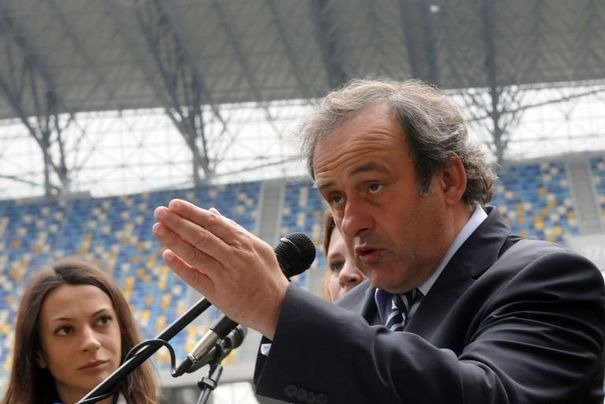
Michel Platini has hit out at "bandits and crooks" for the escalation of Ukrainian hotel prices ahead of the Euro 2012
“It’s annoying to have made a lot of investment and then say to people that they can’t come because there are bandits and crooks who want to make a lot of money during this Euro,” Michel Platini said.
“You can’t change [the price of a room] from 40 Euros [$52] to 100 and then up to 500 just like that, from one day to the other, this just is not done,” Michel Platini said.
Michel Platini is due to open a new airport terminal in the city later with President Viktor Yanukovych.
Euro 2012 championships, which are being held in Ukrainian and Polish cities, begin on 8 June.














